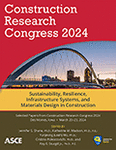Characteristics of Early Adopters and Their Followers of Rooftop Solar, Electric Vehicles, and Heat Pumps
Publication: Construction Research Congress 2024
ABSTRACT
To support electrification and decarbonization, building codes now mandate the inclusion of clean energy technologies in new commercial and residential constructions. However, there is a lack of comprehensive research on how “early adopters” and their “followers” differ in their adoption of various technologies at the city and community levels. By utilizing the Bass model, this study emphasizes the importance of recognizing community and city adoption patterns, understanding the social dynamics of diverse communities at different spatial scales, and considering the traits of early adopters and their followers to effectively promote technology adoption. The study reveals that higher adoption rates of electric vehicles (EVs) and heat pumps are linked to a greater presence of early adopters. Early EV adopters tend to have higher educational attainment and lower home values, while heat pump followers are associated with higher population density. Moreover, the study identifies an inverse correlation between early adopters and followers, as well as with market potential. Interestingly, communities with higher early adopters of rooftop solar tend to have lower followers of heat pumps. This underscores the significance of finding a balance between encouraging innovation and imitation behaviors, alongside promoting the dual adoption of technologies when shaping policies.
Get full access to this article
View all available purchase options and get full access to this chapter.
REFERENCES
Aguilar, F. J., S. Aledo, and P. V. Quiles. 2016. “Experimental study of the solar photovoltaic contribution for the domestic hot water production with heat pumps in dwellings.” Applied Thermal Engineering, 101: 379–389. https://doi.org/10.1016/j.applthermaleng.2016.01.127.
Bass, F. M. 1969. “A New Product Growth for Model Consumer Durables.” Management Science, 15 (5): 215–227. INFORMS.
Batista da Silva, H., W. Uturbey, and B. M. Lopes. 2020. “Market diffusion of household PV systems: Insights using the Bass model and solar water heaters market data.” Energy for Sustainable Development, 55: 210–220. https://doi.org/10.1016/j.esd.2020.02.004.
Bernards, R., J. Morren, and H. Slootweg. 2018. “Development and Implementation of Statistical Models for Estimating Diversified Adoption of Energy Transition Technologies.” IEEE Transactions on Sustainable Energy, 9 (4): 1540–1554. https://doi.org/10.1109/TSTE.2018.2794579.
Brown, A. C. 2016. “The value of solar writ large: A modest proposal for applying ‘value of solar’ analysis and principles to the entire electricity market.” The Electricity Journal, 29 (9): 27–30. https://doi.org/10.1016/j.tej.2016.10.009.
City of Seattle. 2021. “Open Data - Tech | seattle.gov.” Accessed August 21, 2021. http://www.seattle.gov/tech/initiatives/open-data.
Eggimann, S., J. W. Hall, and N. Eyre. 2019. “A high-resolution spatio-temporal energy demand simulation to explore the potential of heating demand side management with large-scale heat pump diffusion.” Applied Energy, 236: 997–1010. https://doi.org/10.1016/j.apenergy.2018.12.052.
Gaur, A. S., D. Z. Fitiwi, and J. Curtis. 2021. “Heat pumps and our low-carbon future: A comprehensive review.” Energy Research & Social Science, 71: 101764. https://doi.org/10.1016/j.erss.2020.101764.
Holland, S. P., E. T. Mansur, N. Z. Muller, and A. J. Yates. 2019. “Distributional Effects of Air Pollution from Electric Vehicle Adoption.” Journal of the Association of Environmental and Resource Economists, 6 (S1): S65–S94. The University of Chicago Press. https://doi.org/10.1086/701188.
Hoogland, K., D. Chakraborty, and S. Hardman. 2022. “To purchase or lease: Investigating the finance decision of plug-in electric vehicle owners in California.” Environ. Res. Commun., 4 (9): 095005. IOP Publishing. https://doi.org/10.1088/2515-7620/ac8397.
Jenkins, K., D. McCauley, R. Heffron, H. Stephan, and R. Rehner. 2016. “Energy justice: A conceptual review.” Energy Research & Social Science, 11: 174–182. https://doi.org/10.1016/j.erss.2015.10.004.
Lan, H., Z. Gou, and B. Cheng. 2020. “Regional difference of residential solar panel diffusion in Queensland, Australia.” Energy Sources, Part B: Economics, Planning, and Policy, 15 (1): 13–25. Taylor & Francis. https://doi.org/10.1080/15567249.2020.1736214.
Lin, Y., and Z. Bie. 2016. “Study on the Resilience of the Integrated Energy System.” Energy Procedia, 103: 171–176. https://doi.org/10.1016/j.egypro.2016.11.268.
Mastropietro, P. 2019. “Who should pay to support renewable electricity? Exploring regressive impacts, energy poverty and tariff equity.” Energy Research & Social Science, 56: 101222. https://doi.org/10.1016/j.erss.2019.101222.
Min, Y., and H. W. Lee. 2023. “Characterization of vulnerable communities in terms of the benefits and burdens of the energy transition in Pacific Northwest cities.” Journal of Cleaner Production, 135949. https://doi.org/10.1016/j.jclepro.2023.135949.
Min, Y., H. W. Lee, and P. M. Hurvitz. 2023. “Clean energy justice: Different adoption characteristics of underserved communities in rooftop solar and electric vehicle chargers in Seattle.” Energy Research & Social Science, 96: 102931. https://doi.org/10.1016/j.erss.2022.102931.
Poruschi, L., and C. L. Ambrey. 2019. “Energy justice, the built environment, and solar photovoltaic (PV) energy transitions in urban Australia: A dynamic panel data analysis.” Energy Research & Social Science, 48: 22–32. https://doi.org/10.1016/j.erss.2018.09.008.
Radomes, A. A., and S. Arango. 2015. “Renewable energy technology diffusion: an analysis of photovoltaic-system support schemes in Medellín, Colombia.” Journal of Cleaner Production, 92: 152–161. https://doi.org/10.1016/j.jclepro.2014.12.090.
US Census Bureau, U. C. 2019. “American Community Survey (ACS).” Census.gov. Accessed November 16, 2022. https://www.census.gov/programs-surveys/acs.
Information & Authors
Information
Published In
History
Published online: Mar 18, 2024
Authors
Metrics & Citations
Metrics
Citations
Download citation
If you have the appropriate software installed, you can download article citation data to the citation manager of your choice. Simply select your manager software from the list below and click Download.
